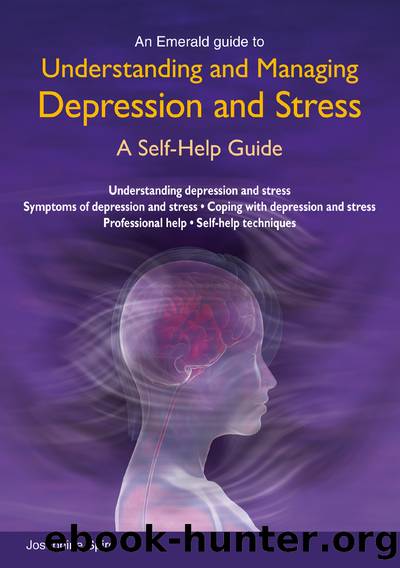Understanding and managing depression and Stress by Josephine Spire

Author:Josephine Spire
Language: eng
Format: epub
ISBN: 9781847167323
Publisher: Straightforward Publishing
Negative thinking in depression
In many cases depression is the result of habitual negative thoughts called cognitive distortions. This is a term used in psychology to describe irrational inflated thoughts or beliefs that distort a personâs perception of reality usually in a negative way. Cognitive distortions come unprompted and always seem true and believable to the thinker, often associated with feeling down or under a dark cloud and can take a serious toll on oneâs mental health. They include;
1. Catastrophizing: Assuming the worst outcomes of situations. "Why bother I will failâ.
2. Mind reading: Assuming that you know what people think about you. âI can sense they donât like me from the way they look at meâ.
3. Personalising: Taking things personally resulting into self-blame. âThe relationship failed because of meâ.
4. Should statements: âI should have done things differentlyâ, âThey should have told me earlierâ.
5. Fortune telling: Predicting the future negatively. âI know that I will fail the interviewâ.
6. Overgeneralization: Perceiving a wide pattern of negatives basing it on a single event. âI am never successful at anythingâ.
7. Labelling: Labelling yourself and other people based on one experience or event. âShe is a horrible personâ, âI am useless at everythingâ.
8. Blaming: Blaming someone or something for your faults.
9. Dismissing the positives: Failing to recognize the good things in your life or the good things about other people. âIt's his job to do thatâ âMy achievements are nothing they donât account for anythingâ.
10. Black and white thinking: Seeing everything in terms of either/or, winner/loser and nothing in between. âIt was a complete waste of timeâ.
11. Magnifying: Blowing things out of proportion.
12. Emotional reasoning: letting your feelings guide your interpretation of reality. âI feel stressed and frustrated about my work, its not working for me, Iâm resigningâ.
13. What ifs: Asking questions frequently of what ifs. âWhat if I fail at it?â, âWhat if they donât like me?â
14. Judgement focus: Evaluating yourself, others and events without accepting or understanding basing your judgement on a personal whim aiming to find shortfalls. âI donât do well enoughâ, âHe always performs better than me.â
Download
This site does not store any files on its server. We only index and link to content provided by other sites. Please contact the content providers to delete copyright contents if any and email us, we'll remove relevant links or contents immediately.
Professional Troublemaker by Luvvie Ajayi Jones(29648)
Whiskey Words & a Shovel I by r.h. Sin(19389)
Rewire Your Anxious Brain by Catherine M. Pittman(18642)
Healthy Aging For Dummies by Brent Agin & Sharon Perkins RN(17035)
Cat's cradle by Kurt Vonnegut(15332)
Talking to Strangers by Malcolm Gladwell(13345)
The Art of Thinking Clearly by Rolf Dobelli(10450)
They Both Die at the End by Adam Silvera(9807)
The 5 Love Languages: The Secret to Love That Lasts by Gary Chapman(9784)
Doing It: Let's Talk About Sex... by Hannah Witton(9275)
The Compound Effect by Darren Hardy(8941)
Thirteen Reasons Why by Jay Asher(8889)
Goodbye, Things by Fumio Sasaki(8575)
Wonder by R.J. Palacio(8569)
Tools of Titans by Timothy Ferriss(8363)
Atomic Habits: Tiny Changes, Remarkable Results by James Clear(8323)
Becoming Supernatural by Dr. Joe Dispenza(8199)
Wonder by R. J. Palacio(8097)
Change Your Questions, Change Your Life by Marilee Adams(7757)
